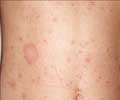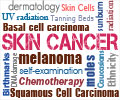Acute skin injuries trigger a signaling cascade that promotes healthy cell expansion and inhibits mutated cell growth, challenging cancer initiation.
- Harnessing the power of healthy cells offers a promising approach to suppressing skin cancer formation and progression
- Researchers have discovered that acute skin injuries trigger a signaling cascade that promotes the expansion of healthy cells while inhibiting the growth of mutated cells, challenging conventional thinking about cancer initiation
- Understanding and utilizing this signaling cascade could lead to the development of innovative therapies that selectively stimulate the proliferation of healthy cells and suppress oncogenic growth in skin cancer
Injury prevents Ras mutant cell expansion in mosaic skin
Go to source).
Could your Skin be the Ultimate Solution for Cancer
Scientists and medical professionals are now investigating innovative methods that tap into the inherent abilities of healthy cells to prevent, hinder, and even reverse the formation of skin cancer.By examining the behavior of cells in both wounded and non-wounded skin, researchers at Yale University have made a fascinating discovery. They observed that skin injuries trigger a series of signals that promote the expansion of healthy cells while simultaneously inhibiting the growth of mutated cells.
This unexpected finding challenges the conventional understanding of cancer initiation, suggesting that acute injury might actually impede tumor formation.
The study conducted by the Greco Lab at the Yale School of Medicine unveils new possibilities for the development of therapies that activate cell signaling pathways, thereby enhancing the selective proliferation of healthy cells and suppressing the growth of oncogenic cells.
Skin Cancer: Normal Skin to Rescue
Current approaches to cancer treatment often target rapidly dividing cells, potentially hindering the natural defense mechanisms of mosaic tissue against tumor cells. These findings offer valuable insights for future innovative approaches in cancer therapy.Sara Gallini, the lead author and a research associate in the Greco Lab at the Yale School of Medicine, expressed, "This discovery completely shifts our understanding of how cancer begins and suggests that acute injury may actually counteract tumorigenesis."
Harnessing the potential of these normal cells presents a promising avenue for cancer treatment, highlighting the possibility of innovative therapeutics that activate cell signaling pathways to selectively promote the proliferation of healthy cells while suppressing oncogenic growth.
Reference:
- Injury prevents Ras mutant cell expansion in mosaic skin - (https://pubmed.ncbi.nlm.nih.gov/37344586/)
Source-Medindia
















